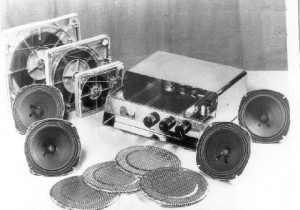Earl “Madman” Muntz was a former Kaiser-Frazer automobile dealer who had earned his nickname through his loud, flamboyant television commercials. His motto was “I buy ’em retail and sell ’em wholesale. It’s more fun that way!” Already a national celebrity by the 1950s, he soon jumped from auto sales to electronics, opening a chain of television retail outlets.

The sets he sold were manufactured by another of his other firm’s, Muntz Television Inc., and they were based on a clever design that saved a few bucks on parts and assembly. The TV business had its ups and downs, and Muntz went from riches to rags when he landed in bankruptcy court in 1955,and then back to riches a few years later when the market turned around. He discovered the Fidelipac in the early 1960s, and after selling Muntz TV, he threw in his lot with the endless loop (although in later years he re-entered the TV industry with a line of big screen TV sets).
Muntz had inexpensive Fidelipac players custom manufactured in Japan, and licensed the music of several record companies for duplication on carts. Even though the players were intended to be installed in cars, where “hi-fi” hardly mattered, Muntz sought to enhance the appeal of his product by adopting the stereo tape standards established by recorder manufacturers a few years earlier, and his players used the new, mass produced stereo tape heads being made for the home recorder industry. These heads put two stereo programs, a total of four recorded tracks, on a standard 1/4 inch tape.
Muntz players caught on quickly, starting an autosound fad in California which then began to spread east. By 1963 Muntz players were to be found stylishly adorning the underdash regions of Frank Sinatra’s Riviera, Peter Lawford’s Ghia, James Garner’s Jaguar, Red Skelton’s Rolls Royce, and Lawrence Welk’s Dodge convertible, not to mention Barry Goldwater’s ride (make not known). During 1964 and 1965 a number of major labels began issuing new releases and old favorites on 4-track, and the Fidelipac looked like it was going to be the next big thing in consumer audio. A number of home players even appeared.